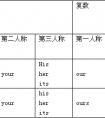用方框中所给词或词组的适当形式完成下列句子。Outgoing they friend do well in hang out1. A few days ago they went to the City Museum. There they enjoyed _____.2-八年级英语
answer the telephone 接电话
名词在句中作主语,宾语,介词宾语,宾语补足语,表语以及名词短语作状语。
1.主语:The bagis in the desk.书包在桌子里边。
2.宾语:I washed my clothes yesterday. 昨天我洗了我的衣服。
3.表语:This is a good book. 这是一本好书。
4.宾语补足语We selected him our monitor.我们选他为我们的班长。
5.介词宾语Mary lives with her parents.玛丽和她的父母住在一起。
6.定语:She is a Partymember. 她是一位党员。
名词口诀:
一、人和事物各有名,万千名目可辨清。表示名称即名词,具体抽象有不同。
时间空间和地点,方向位置有专称。主宾定表都可作,名词具有多功能。
二、可数名词不可分,若要分离变性质。不可数名词可分离,一分再分仍原物。
英语名词特殊用法:
1.family指“家庭”时,强调全体;指“家里人”时强调个体,与住房无关
home指“家”,表示同一家庭共同生活的地方,具有感情色彩
Kate has left home for school.可作副词也可作名词,意思是“在家”
house指“住宅”、“住房”The Greens live in a big house.
2.man总称“人”、“人类”,用单数
people泛指“人们”,表示复数概念:People often work in the day.
指“人”的个体,但只表示复数概念:There are five people in my family.
前面加定冠词指“人民”,表示复数概念:Let’s work for the people.
指“民族”时,有单、复数之分:The Chinese people is a hardworking people.
person强调“人”的个体,有单、复数之分:There are five persons in my family.
3.police总称“警察”,表示复数概念:
policeman强调“警察”的个体,有单、复数之分:My father is a policeman.
4.universe指“宇宙万物”,强调物质概念:
When we talk about the universe,we mean the earth, the sun,the moon and many other stars.
space指“太空”、“宇宙空间”,强调空间概念:
Many countries have sent up the satellites into space.
“空间”、“余地”、“空地”:There is no space on the bus.
5.不同国家的人的单复数:
|
名称 |
总称(谓语用复数) |
一个人 |
两个人 |
|
中国人 |
the Chinese |
a Chinese |
two Chinese |
|
瑞士人 |
the Swiss |
a Swiss |
two Swiss |
|
澳大利亚人 |
the Australians |
an Australian |
two Australians |
|
俄国人 |
the Russians |
a Russian |
two Russians |
|
意大利人 |
the Italians |
an Italian |
two Italians |
|
希腊人 |
the Greek |
a Greek |
two Greeks |
|
法国人 |
the French |
a Frenchman |
two Frenchmen |
|
印度人 |
the Indians |
an Indian |
two Indians |
|
加拿大人 |
the Canadians |
a Canadian |
two Canadians |
|
德国人 |
the Germans |
a German |
two Germans |
|
英国人 |
the English |
an Englishman |
two Englishmen |
|
瑞典人 |
the Swedish |
a Swede |
two Swedes |
|
日本人 |
the Japanese |
a Japanese |
two Japanese |
|
美国人 |
the Americans |
a American |
two Americans |
考点名称:形容词的比较级,形容词的最高级
- 形容词的比较级:
当两种物体之间相互比较时,我们要用形容词或副词的比较级;
当相互比较的物体是三个或三个以上时,我们就要用形容词或副词的最高级。 形容词的比较级和最高级的特殊变化规则:
一、少数单音节词前面加 more-, most- 构成比较级和最高级
tired ---- more tired , most tired
fond ----- more fond , most fond
glad ----- more glad , most glad
bored ---- more bored , most bored
pleased---- more pleased , most pleased二、不规则变化
good /well------- better ,best
bad/badly/ill------ worse , worst
many/much-------more , most
little ------ less , least
far ---- farther, farthes / firther , furthest
old ---- older , oldest (GA)
---- older , oldest / elder , eldest (GB)三、下列形容词和副词的比较级和最高级有两种形式
cruel----- crueler, cruelest /more cruel , most cruel
strict---- stricter , strictest /more strict , most strict
often----- oftener , oftenest / more often , most often
friendly------ friendlier , friendliest / more friendly , most friendly
clever----- cleverer, cleverest / more clever , most clever四、下列形容词和副词没有比较级和最高(即表示”最高程度”或”绝对状态”的形容词和副词没有比较级和最高级)
empty , wrong , perfect , unique , extreme , excellent , favourite (GB)/ favorite (GA) , true , right , correct , extremely ...- 形容词的比较级和最高级用法:
形容词比较等级用法:
1.没有比较对象时,用原级。
I have a new computer.
2.两者比较,程度相同。
A+系动词+as+adj.+as+B.
Our school is as beautiful as theirs.
3.两者比较,程度不同。
A+系动词+not as+adj.+as+B.
The weather here is not as hot as that in the south.
4.A比B更…
The earth is bigger than the moon.
5.比较级前可以用much,even,still,far,a lot,a little,a bit,any等修饰。
Your room is much bigger than mine.
I’m a little shorter than her.
6.用比较级可以表示最高级含义:
John is stronger than any other boy in his class.=John is stronger than any of the other boys.
两者不属于同一范畴,不能用other.
Chongqing is bigger than any city in Sichuang.
7.“比较级+and+比较级” 表示“越来越…”
China is becoming more and more beautiful.
Days are getting longer and longer.
8.用the+比较级,the+比较级 表示”越…就越…”.
- 最新内容
- 相关内容
- 网友推荐
- 图文推荐
| [家长教育] 孩子为什么会和父母感情疏离? (2019-07-14) |
| [教师分享] 给远方姐姐的一封信 (2018-11-07) |
| [教师分享] 伸缩门 (2018-11-07) |
| [教师分享] 回家乡 (2018-11-07) |
| [教师分享] 是风味也是人间 (2018-11-07) |
| [教师分享] 一句格言的启示 (2018-11-07) |
| [教师分享] 无规矩不成方圆 (2018-11-07) |
| [教师分享] 第十届全国教育名家论坛有感(二) (2018-11-07) |
| [教师分享] 贪玩的小狗 (2018-11-07) |
| [教师分享] 未命名文章 (2018-11-07) |

![One of the climbers tried to pull ______up the rocks. Finally, he was lucky to get to the top. [ ]A. themselves B. himselfC. herself D. itself-八年级英语](http://www.00-edu.com/d/file/ks/4/2/fanshendaici/2019-12-01/small41ed7588e270175b6fd8ba260e900d321575203896.png)
![Sally buys a watch for father andasweater for_______.[ ]A. she; herselfB. her; herselfC. herself; herD. her; her-七年级英语](http://www.00-edu.com/d/file/ks/4/2/fanshendaici/2019-12-01/small3f1788cd5867bf4768797f36ec9e81961575203859.jpg)


![Don't lose ________ computer games, little boys! [ ]A. yourself toB. yourself in C. yourselves to D. yourselves in-八年级英语](http://www.00-edu.com/d/file/ks/4/2/fanshendaici/2019-12-01/smallce83f3a5e50b48d2e8ee989a20c11b101575203887.png)
